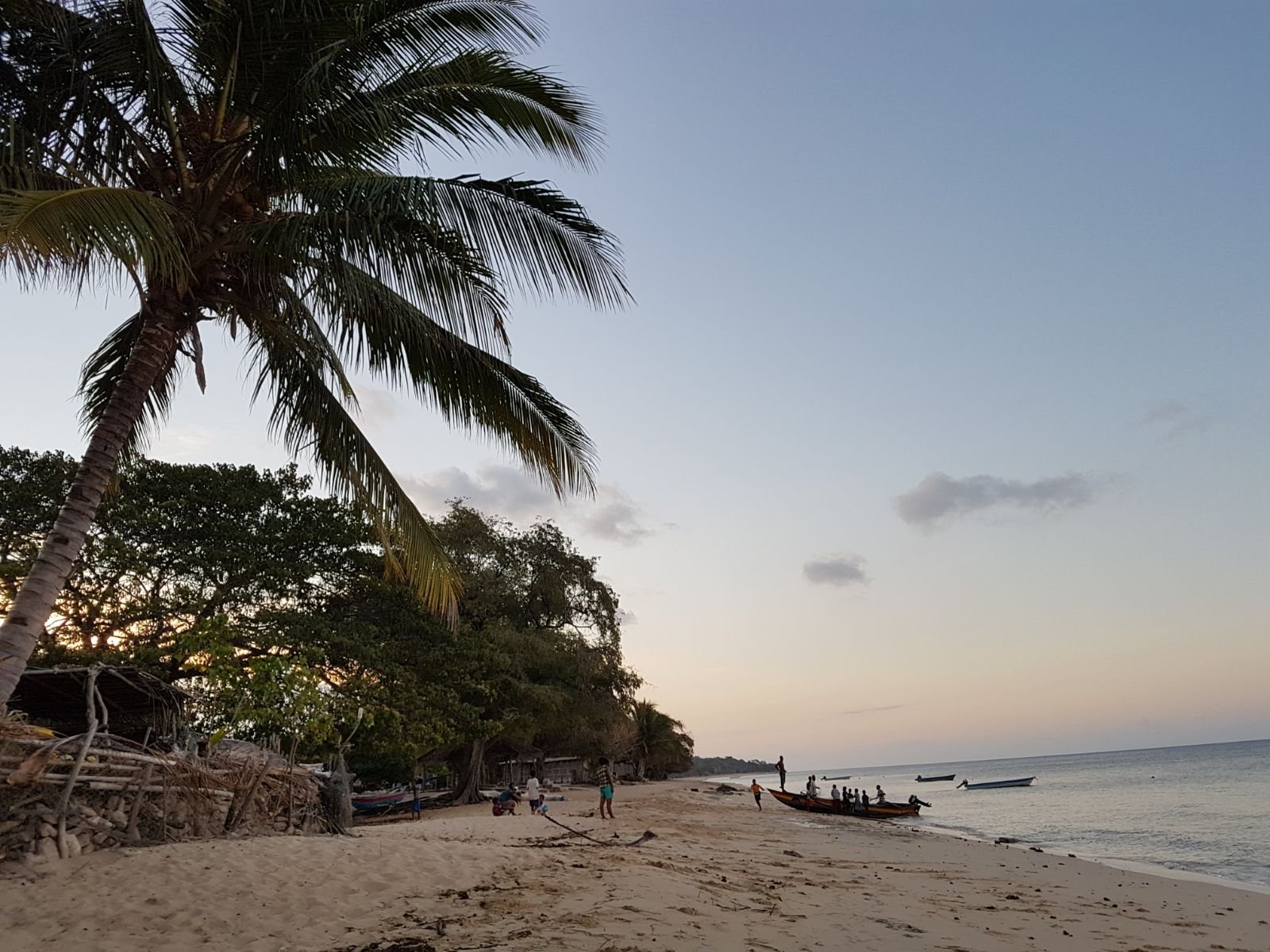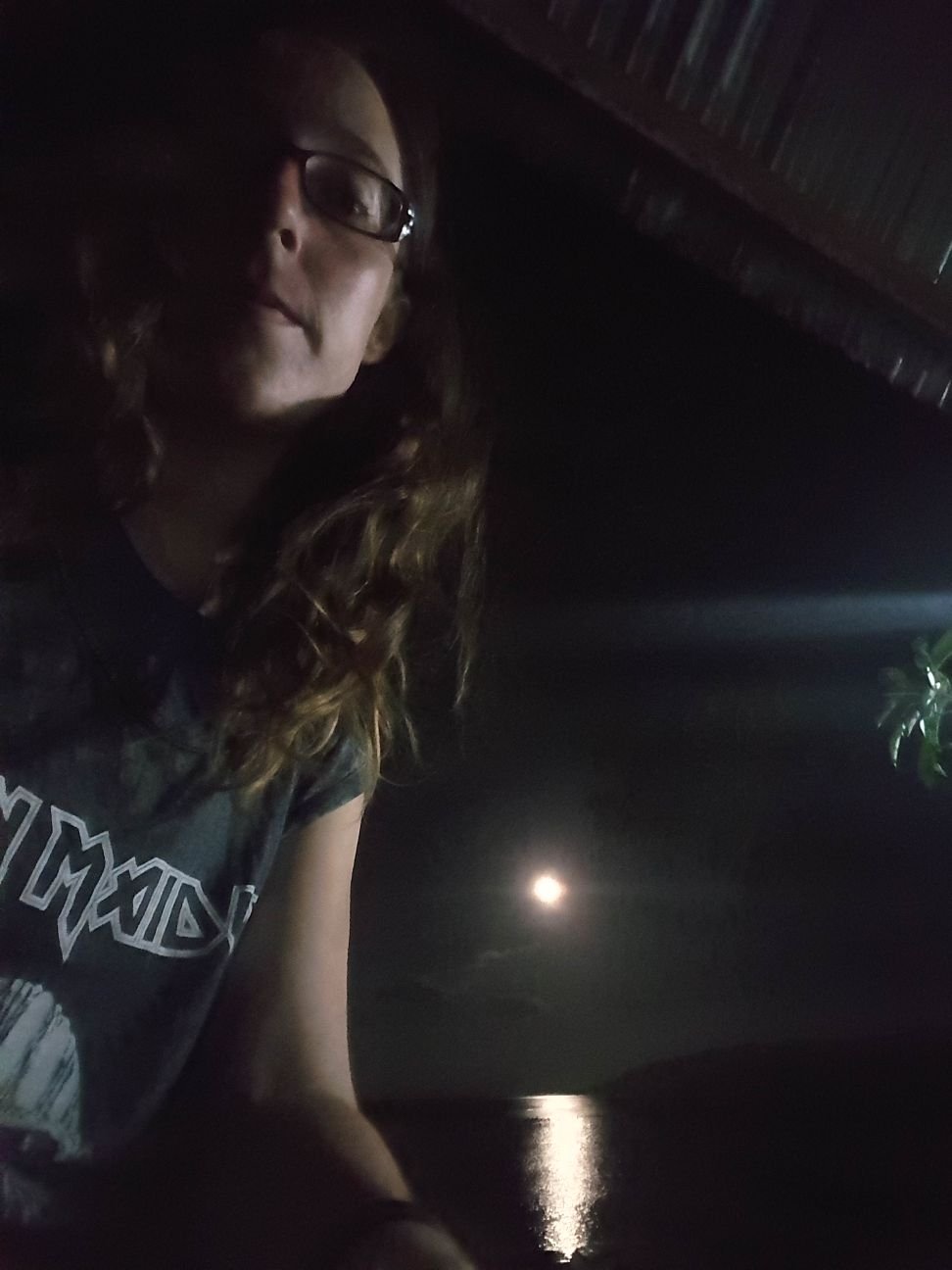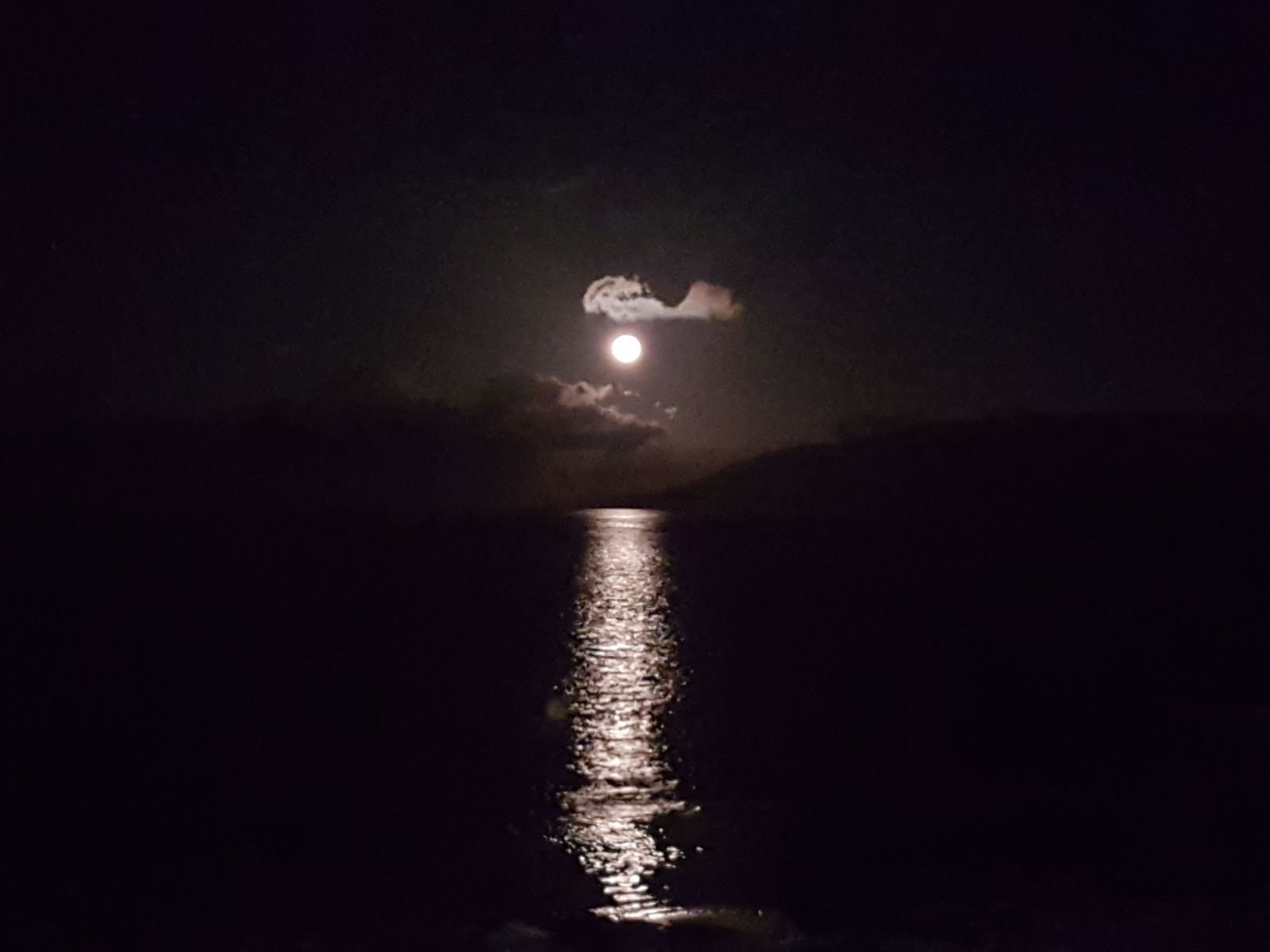Moonrise in Com
Time to get back on the road and explore the wilds of Timor. I’d been told that I ‘couldn’t’ ride ride around the island because the roads in the South were too bad, and I wouldn’t get through; so that was exactly where I was going.
It was another beautiful sunny-bleached day, riding broken tarmac through villages and along the coast. I stopped at bamboo shack perched between the sea and the road and ate a fish as a late lunch. It was tiny – a mackerel – but I sucked the flesh and oil off its little bones. There were packets of cooked white rice in banana leaves and I ate three of them, slicing the leaves with a knife and eating the plan rice with my hands. It may not have been a feast, but there was nothing else.
That evening, I made it into Com as the sun was going down. It’s a tiny fishing village; bamboo huts nestled up to the beach with wooden fishing boats pulled up between them. It looked like a king tide would wash the whole place away.
I had been told that there was a cheap guest house in Com, but it didn’t seem to exist in real life. Instead, there was an expensive guest house built right on the beach – well, expensive by Timorese standards. It had a pleasant eating area, and a line of simple rooms facing out to the beach; the building’s foundations dropped directly into the sand.
As I rode conspicuously down the tiny street, the manager of the guest house ran out and ushered me in. I let them corral me, enquired about the price, and then told that unfortunately I couldn’t afford it. I wasn’t trying to bargain; it was well out of my price range and that was my problem, not theirs. I’d seen an empty playing field on my way into town, and wondered if I might be able to pitch my tent there.
However, every time I politely turned down the offer of accommodation, the price became cheaper. Eventually, it reduced so far that I could actually afford it; I gratefully accepted, and the manager threw in a free breakfast on the condition that I never told anyone else how much I paid.
I was the only guest, and took my pick of the rooms. The bathroom was down the end of the verandah, but clean. The room had a big double bed with fresh sheets and a new mosquito net that fell in bright white folds, creating the fairy tale fort that I’d always wanted as a child. I was happy.

After a bucket shower, I walked along the beach and watched the fishermen bringing in their catch as the sky turned pink. There was a swarm of children of various ages, and a young woman keeping an eye on them with a baby on her hip. Her name was Francisca; we managed to exchange a few words in stumbling Indonesian; the children were her younger siblings, and the baby her first son.
She was radiant; blissfully relaxed, she looked almost a cliche of healthy, contented motherhood. I though she was beautiful.
Later, her mother came down to the beach and took the baby from Francisca. Then came grandma, sitting on a rock, chewing betel nut with three or four violently red-stained teeth. She was a very old woman, the matriarch of the whole operation. There were perhaps twenty or more members of her family on the beach now, carefully disentangling mackerel from the fishermen’s net while the little boys splashed in the shallows and the men dragged the boat up the beach.
She decided that I was interesting, and summoned me over: she was clearly used to being obeyed. In this country where the majority of the population is under the age of 15, with older generations thinned by decades of conflict, age is treated with appropriate sanctity.
Grandma grabbed my arm and started talking to me animatedly in the local dialect, not even Tetum. I had not the faintest idea of what she was saying, but that didn’t seem to bother her at all. I smiled and sat with her.
Later, as the light faded, I realised that she was deeply concerned by my unattended status. Where was I staying? Why was I alone? I shouldn’t be on the beach alone!
Somehow her meaning penetrated the language barrier, and I managed to explain that I was staying at the guest house. She thought that was okay and jumped up with surprising energy for a bird-like woman of indeterminate age. Again, she grabbed my arm and walked me up the beach.
I was slowly getting used to all of this grabbing between women. It’s quite a common thing in Timor; young women will link their arm through yours or hold your hand, and older women will grab just grab you and steer you places.
Grandma steered me to her nephew (or great-nephew, maybe?) and instructed him to walk me back to the guest house.
He was a nice young man, just back from university with a degree and a smattering of English, but not working yet; a common situation in Timor Leste. I don’t imagine there are a lot of jobs for university graduates in a fishing village like Com, but he didn’t seem too worried either. His family is here, and so he has a home and food to eat. Cigarettes are cheap and his father is a fisherman, every night bringing home fish from the sea.
I skipped dinner and spent my pennies on a can of beer. My afternoon fish hadn’t been that long ago, I reasoned, and the beer gave me disproportionate pleasure. As I sat on the verandah of the guest house, dangling my feet over the sand, I could watch the full moon rising over the sea and feel the beer flooding my veins with mellowness.

The fisherman were out in the bay again, fishing in the light of the moon; I could hear them singing in the still night.
I went to bed and slept to the sound of lapping waves and the fishermen’s songs.

***
I open my eyes the next morning to sunlight softly diffusing through the mosquito net, and I could hear the waves slapping the beach, louder than last night. Padding outside in my bare feet, I saw that the tide was high – the sea had come within a few metres of the guest house, and was starting to turn again.
I took my book and serenely breakfasted on warm doughnuts and a whole pot of black coffee. The plate was full of warm bread rolls – enough for three people; I don’t know if I was expected me to eat them all, but I did. I lingered there, reading my novel in sea breeze, at peace with my morning coffee.
After breakfast my friend from the previous evening – the nephew – came by to show me some of Com’s most special places. We rode our motorbikes a little way out of the village – behind the playing field I’d seen the previous evening – then walked up among the jagged basalt outcrops. Suddenly, the ground fell away into a deep waterhole ringed by cliffs. The water was still and dark. The name of the place translates as ‘Dead Water’; there are no crocodiles, but plenty of spirits. The locals won’t swim there.
But taking selfies – well that’s a different matter. Here in Timor, the selfie is King.

Near the dead water, I saw my first wild monkeys. There were three of them – mum, dad, baby – swinging their way down the opposite cliff to drink. They looked at us, and then ignored us and went on with their day; I got that strange feeling I always get around primates.
On the way back, we explored my friend’s family’s traditional house – a holy house, he called it. Built entirely out of wood, it’s up on stilts – maybe twelve feet off the ground – and square in shape, with a high pointed thatch roof. You climb inside using a ladder, through a hole in the floor. It looks as though you could pull the ladder up in times of strife – like pulling up a draw bridge – but my friend assured me that isn’t what it’s for, that there’s no tradition of inter-village marauding in Timor.
The house had a tray of compacted dirt on one side of the room, making a fireproof platform for a cooking fire, and windows that let in the sea breeze. Nobody lives in these houses anymore, but most families still have one as a place for meetings and special occasions. From the graffiti on the beams, I could see that the local youths come out and here to hang out and smoke cigarettes too.
When I left Com, trailing through the villages on my way to Lospalos, the road was full of people on foot. It was Sunday. I felt big and intrusive on my motorbike, and carefully threaded my way around the old ladies and little girls, in their best dresses, on their way to church.
[youtube https://www.youtube.com/watch?v=tkweYs22qaI&w=560&h=315]



I’m loving your tales of Timor Leste more and more Grace. You’ve got to all the places I wasn’t able to visit after my crash. I love your style of writing too. Keep ’em coming please!
Thanks Geoff! I’m finally feeling up to writing again, it’s a good feeling.
A beautiful description of your stay. I was amused by you saying that you get a strange feeling around primates. I do as well, so imagine how it must feel to have Donald Trump as president.
Best. Comment. Ever. ????
Very much agreed. 😉